World Champion Ju Wenjun defeated Lei Tingjie in game eight of the World Championship Match, as the challenger misplayed in the endgame. Instead of finishing her opponent swiftly, Ju went for a position with a minimal advantage but managed to squeeze a victory in the end, despite Lei having one chance to save a draw
Game eight of the Match for the title of Women’s World Champion unfolded calmly. Starting with 1.Nf3, the defending World Champion Ju Wenjun opted for an opening sideline leading to a positional game.
In the manouvering that followed it seemed that Ju was more in sync with the position and gained a minimal edge, but it was overall equal. Lei’s pieces were a bit uncoordinated which she resolved by an excellent move 21…a4, giving up a pawn but forcing an exchange after which it was even.

Just as it seemed the two were heading for a technical draw, Lei decided not to follow the simplest line but instead opted for 28…Nb3?!, which gave White chances. Ju took them and soon, Lei was struggling – with pieces hanging and severely low on time, the challenger was in dire straits.
Finally, everything aligned for the defending World Champion: she obtained a significantly better endgame and had a substantial time advantage. However, instead of finishing off her opponent with an attacking move, Ju opted to go for an exchange of pieces, ending a pawn up, but with a minimal advantage on the board. Like in game seven, Ju again gave Lei chances for a save in the endgame.
In a long trench-style endgame fight that ensued, where progress was measured in inches, Lei had to hold a very uncomfortable position. Although the computers gave White a minimal edge, from a practical standpoint this was a very tough endgame for Black, who was doomed for a long defence with any mistake being fatal.

Miraculously, Ju allowed Black one last chance for a draw in the end on move 56. Even though Lei made the drawing move, she missed the saving idea, choosing the wrong continuation. White was winning again.
Eventually, playing with just a minute on the clock, Lei faltered. Ju managed to squeeze a victory, albeit going the long way round.
Asked about how she felt after the victory, Ju said her happiness level is now “on eight out of ten”.

Despite losing the game, Lei Tingjie was smiling in the press conference. She was frank: “I didn’t play precisely and gave chances to my opponent. I probably deserved to lose”.
After letting victory slip in round seven, a point in game eight is a critical leap for Ju Wenjun. Winning a drawn endgame and equalising the overall score gives the defending World Champion a psychological edge. Lei will now need to show that she has enough strength and perseverance to mount a comeback. After all, maintaining composure after severe blows is fundamental for an existing or aspiring World Champion.
Here follows a closer look at game eight of the match:

The honorary guests making the first move in today’s round were Dai Ming, Deputy Secretary of the Party Committee of Changshou District and Chief Executive of the District-level Government and Luo Li, Employee of Sinopec Chongqing SVW Chemical Co Ltd.
The World Champion, Ju Wenjun, was White. Most of the time, she would open 1.d4, but now she played 1.Nf3 – keeping her options open. Lei responded with 1…d5 and after 2.e3 c5, Ju opted double fianchetto setup stepping into uncharted territory with the early 6.d2-d4.
Grandmaster Alik Gershon said that it has become clear that the “team Ju is trying to take the initiative in the openings”, to respond to the fact that in the first part of the match, Lei was the one launching opening surprises.
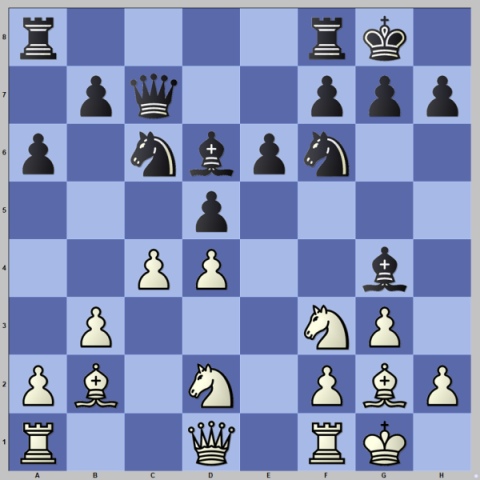
Both sides have finished development, entering a long positional manoeuvring game.
12.a3 a5 13.h3 Bh5 14.Qe2 Rfd8 15.Rac1 Commenting on the position, Grandmaster Judit Polgar – the strongest woman chess player in history – was a bit critical of the challenger, saying that she “feels that Lei is misplacing her pieces a bit. Pawn on a5, rook on d8… If you want to have a good spot it should be on e8…”.
Polgar pointed to an important moment in the positions such as this one: “This is very tricky in this complicated middlegame positions – where do you put your rooks? When you play a system, it’s very important to understand the position of the rooks. When the position opens up, the rooks will play an important role, but then you’re not going to have time to regroup them so easily, so where you position them early in the game matters”.
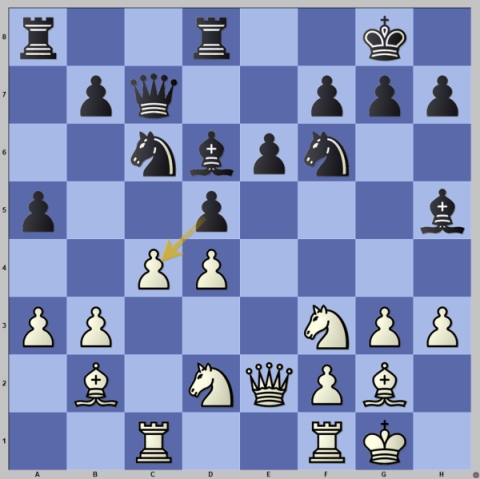
15…dxc4 Lei abandoned holding the tension and decided to take on c4, inviting White to the so-called hanging pawns structure. Ju spent quite a bit of time thinking about her move, although bxc4 was obvious.
“I’m shocked”, said Polgar – commenting on the length of time Ju was taking in this seemingly clear position.
16.bxc4 played after eight minutes.
16…Be7 16.Qe3 Rac8 18.Rfe1 The position was still even, but now the d-file is open for Black. At the same time, one of the main attacking opportunities for White is to sacrifice the d-pawn with a d5-push and open the h1-a8 diagonal for the white-squared bishop, as noted by Judit Polgar.
However, it seemed that the challenger was struggling to find the right moves and get into the groove for the position on the board. Ju picked up the speed in which she was playing her moves and also got a slightly better position, with more initiative across the board.
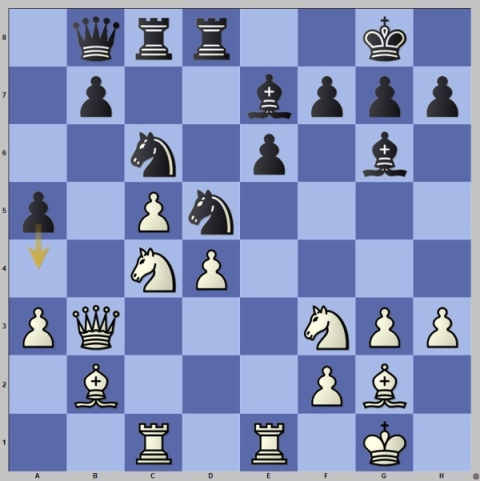
21…a4! A move suggested by the computer. Lei is giving up a pawn to force massive exchanges on the board. It allowed Black to trade several poorly coordinated pieces and regain some space for play.
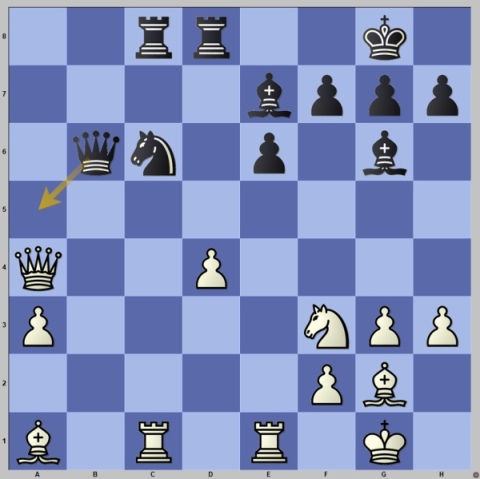
Despite being a pawn down, Black has enough activity to counter it. Also, White’s d5-pawn is hanging. Black now decided to exchange the queens, and the game was going towards a draw.
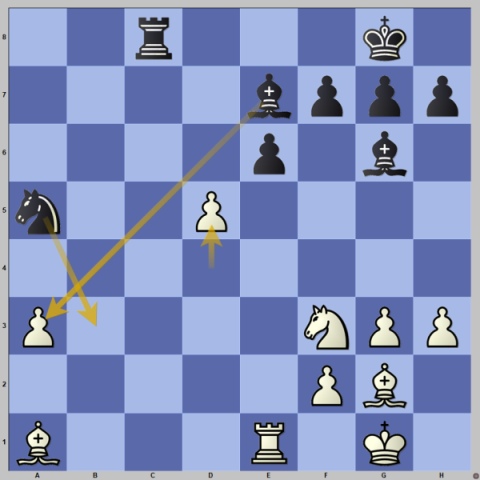
With 28.d5, Ju got rid of her isolated pawn.
Now, instead of simply snatching the a3-pawn (28…Bxa3), Lei decided to do something different.
28….Nb3? was a step in the wrong direction, offering White some chances.
29.dxe6 Played almost instantly by Ju. By this point, Ju had 25 minutes on the clock, and Lei was down to 10 minutes.
29…fxe6 30.Be5 White is slightly better. As Lei was thinking, the time on her clock was slipping. She responded in three and a half minutes. With just seven minutes on her clock and ten moves away from the first time control, it was becoming increasingly uncomfortable for the challenger.
30…Bxa3? What was a good choice two moves ago now put Black on the brink of defeat. Lei should have secured the position of her b3-knight with 30…Be8, followed by Ba4.
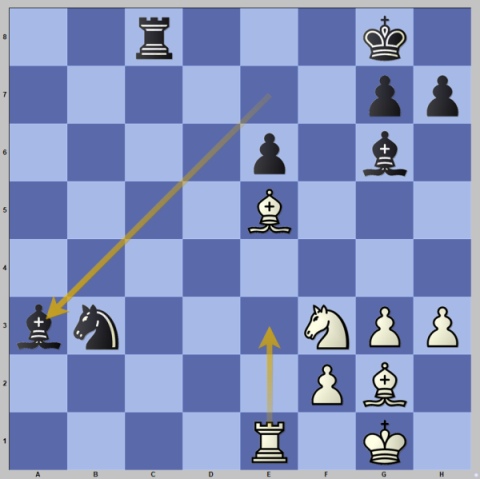
31.Re3! The tables have completely turned on Lei. She was in deep trouble without time to carefully think things through.
31…Bc2 32.Nd4? Instead of the strongest 32.Ne1, which would most likely have decided the game, Ju opted for an inferior move, which significantly helped Black fight back.
Now, with a series of exchanges, Black defused a lot of the pressure.
32…Nxd4 33.Rxa3 Nc6 34.Bxc6 Rxc6 35.Ra8+ Ke7 36.Ra7+ Ke8 37.Rxg7
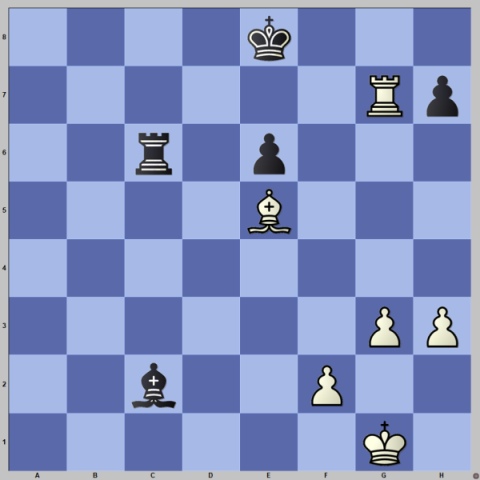
Black is a pawn down, her king is cut off on the eighth rank. The position is very much in Ju’s style – playing on a small advantage, trying to squeeze a victory testing different plans. Although the computer assessed the position as almost equal, in a practical game, Black was up for a long uphill struggle, with any slip being fatal.
Soon the two reached move 40 and the first time control. A long trench-style battle was ahead.
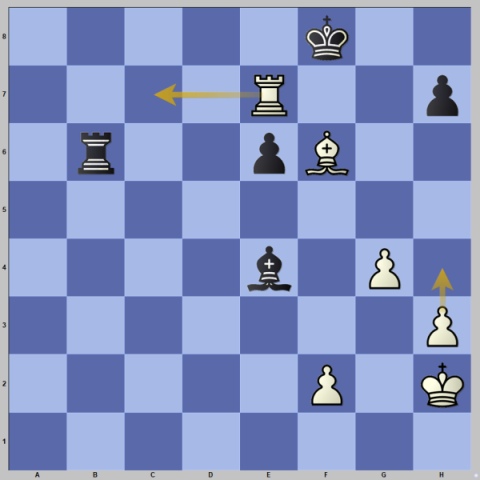
Either 42.Rc7 or 42.f3 even was leading White to a much better position. Instead, Ju played 42.h4?! allowing Black to nearly equalize. However, Lei was not up to the challenge.
42…Rb3? After 42….Rb2 ! Black’s task of saving the game would have been much easier. White got the upper hand again.
43.Rxe6 Bf3 44.g5 – being two pawns down, it is extremely difficult for Black to hold.
White gradually advanced her pawns and then started pushing her king forward. Lei continued to fight back and tried to build a line of defence on the light squares.
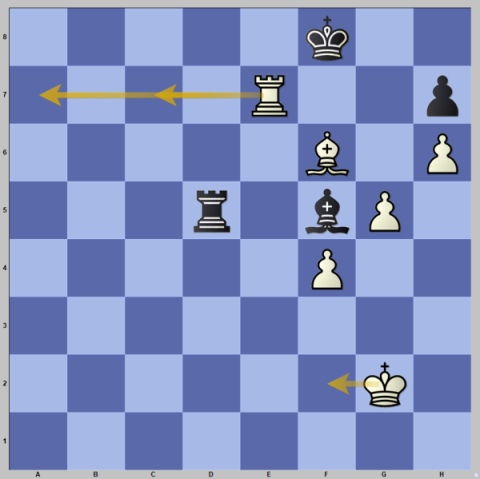
And now a miraculous thing happened: White needed to play Ra7, Rc7 or Re1. Instead, White made a mistake in dropping the advantage completely!
56.Kf2?? after this seemingly natural move, Black got a great chance to escape. 56…Rd2+! 57.Ke3 and Lei could have saved the game with 57…Rd3+ and Black holds, proving the saying – it’s never over until it’s over! However…
57…Rd6?? Most likely, the challenger missed that after 57…Rd3 58.Ke2 Rd4! attacking the f4-pawn, her rook can’t be taken as it leads to a drawn opposite-coloured bishop endgame.
White was in control again while Lei faced an insurmountable task of defending this position with a couple of minutes on the clock. Eventually, Ju implemented one of the winning ideas – an exchange sacrifice to promote a pawn – and sealed the deal on move 72.
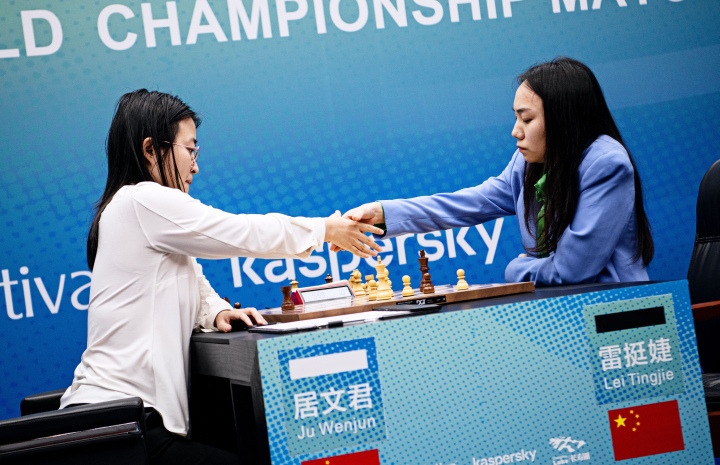
With this victory, Ju Wenjun levels the score. With four more games planned for the classical match, the race is again wide open.
Monday, 17th July, is a rest day. Game nine will take place on Tuesday, 18th July, at 3 PM Local Time in Chongqing (GMT +8).
Text: Milan Dinic
Photos: Stev Bonhage and David Llada
Official website: womenworldchampionship.fide.com/
About the Match
The match will take place in two Chinese cities, where each of the contestants comes from. The first half of the match will be in Shanghai, while the second half takes place in Chongqing.
The match will consist of 12 games of classical chess. The payers will have 90 minutes for the first 40 moves, followed by 30 more minutes for the rest of the game, plus a 30-second increment per move starting on move one.
Players cannot offer a draw before they reach the 41st move.
In case of a tie, there will be the following tiebreaks:
Four games with a 25+10 time control.
Two games with a 5+3 time control.
Two more games with a 5+3 time control.
One game with a 3+2 time control, until a winner is determined.
The prize fund is €500,000, with €300,000 going to the winner and the remaining €200,000 to the runner-up.
If the outcome of the match is decided upon tiebreaks, the winner will take €275,000, while the runner-up will receive €225,000.


